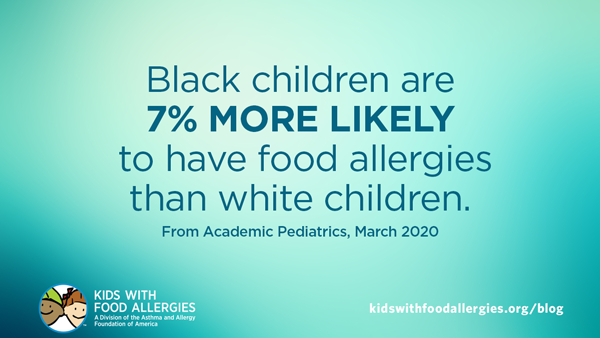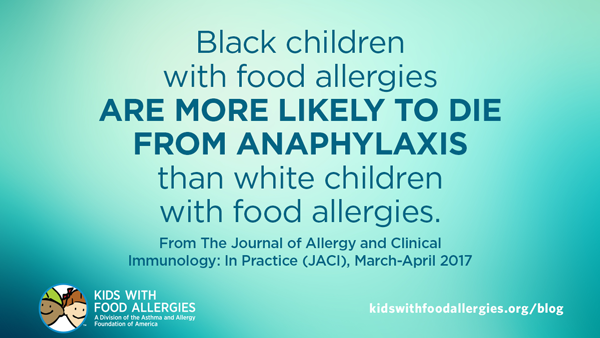By Kafi Drexel Brown
Asthma and Allergy Foundation of America, Public Relations Director
I have a confession. While health and wellness have been a longtime focus of my life and work, I didn’t give food allergies much thought until I joined the Asthma and Allergy Foundation of America (AAFA) as its public relations director. It also didn’t hit me how odd it is I haven’t considered food allergies an important factor in my life until having a conversation with a colleague about how racial disparities impact people living with food allergies. Why is this so odd? Because almost EVERYONE in my family, both immediate and extended, has food allergies. But maybe it’s not so odd when you consider my race…
When I was a kid, my dad had a bad reaction to shrimp on a family trip. As a kid it was pretty terrifying to see his face and lips swell and hear him starting to gag. After a visit to the emergency room, we were back on the road hours later. I never learned what was done to get his reaction under control – just that my dad was OK and we could keep our trip moving. According to my mom, this wasn’t the first time dad had a bad reaction to shellfish. He accidentally ate an hors d’oeuvre containing crab or lobster while on a date with her at a college cookout. He promptly started vomiting but was smooth about it, regrouped and somehow kept it moving. (My dad could pull off pretty much anything as smooth.) He had a few other scary food allergy episodes in his adult life, but we never kept this top of mind – it was just something we knew to avoid. This is the case for so many of my family members who have food allergies. No one carries an EpiPen® or epinephrine auto-injector regularly. Despite some close calls, no doctor ever suggested protecting ourselves against food allergies should be a priority. We just learned to stay away from things and keep it moving.
This seems to be the story for a lot of people with food allergies, especially Black Americans. We discover we have a food allergy, but there’s often no major medical follow-up – or families aren’t fully educated on the risk. My brother has epilepsy, and a serious peanut allergy was also discovered as a kid, but he wasn’t given a life-saving epinephrine auto-injector until he was an adult. The same thing goes for my sister who has sickle cell disease. She also has asthma, eczema and is allergic to several things, including various foods. My mom is 72 and was tested for allergies in the past couple of years. We discovered she may be allergic to pretty much the whole grocery cart and then some, but there was never any real follow-up from her doctor. She was especially upset to test positive for peanut and shellfish allergies because she loves shrimp, scallops and peanut butter. But she hasn’t had a real-life reaction to any of those foods. Her results may be the product of broad panel testing that often isn’t accurate. She’s been left in limbo of not really knowing which foods are actually harmful to her.

My colleague, who is the financial controller for AAFA, has a similar experience. He’s allergic to shellfish, banana and recently discovered he has oral allergy syndrome.
“Growing up I had these allergies, but it never felt like I had a solution other than I just avoid these foods,” he shared. “It feels culturally like allergy is not like a condition or problem. It’s just an acceptance you hope you don’t encounter and move on.”
It’s the same pattern: acknowledgment of a health problem without necessarily realizing how major it could be, so instead you keep things moving.
My family has also been admittedly more preoccupied with managing my brother’s epilepsy, my sister’s asthma and sickle cell disease (not fully understanding the link her asthma and eczema has to food allergies), diabetes and kidney disease. My dad, who’d undergone two kidney transplants, passed away in 2018 after decades of illness due to continuing to fight kidney disease and heart failure. Given the societal pressures and heavier burdens Black Americans often have to weigh, especially when it comes to our health, it’s almost as if we’ve had to become somewhat of “keep it moving” aficionados. When it comes to food allergies, that’s likely because we still have far to go.
Statistics seem to be all over the map on food allergy and race. Multiple studies show the chances of having an allergy vary greatly based on race and ethnicity. As more data emerges, prevailing evidence shows some striking inequities. In 2016, researchers at Rush University Medical Center, Cincinnati Children’s Hospital Medical Center and Lurie Children’s Hospital of Chicago found Black and Hispanic children have higher rates of corn, shellfish and fish allergies. They also saw more trips to emergency rooms and had higher rates of anaphylaxis than white children. The first-of-its kind study confirmed race and ethnicity may be key factors in how people are affected by food allergy.
At the time the research was released, experts noted while an increase in children with food allergy has been well-documented in the U.S., data was lacking on the frequency and severity of outcomes for minorities.
“Nearly all available information is focused on Caucasian children because food allergies are thought to be an issue of affluent societies and higher-income families,” said Dr. Mahboobeh Mahdavinia, principal investigator of the study.
The research also showed Black and Hispanic kids received less care compared to white children. This includes less follow-up care from allergy specialists. It also tracks with an implicit bias problem in health care that follows people of color throughout our lifespan.
Mahdavinia went on to say, “The belief that food allergy is a problem mainly for white children is something clinicians need to reevaluate.”
In a most recent study published in the Spring 2020 issue of "Academic Pediatrics," researchers said Black children were 7% more likely to have food allergies overall compared to white children. Pacific Islander, Native Hawaiian and Asian children were 25% more likely to have food allergies. Black children with food allergies are also more likely to die from anaphylaxis than white children with food allergies. The study, which focuses on the prevalence and common links associated with U.S. children enrolled in Medicaid, found food allergy may be underdiagnosed in poor families. The results also show some of the same racial differences discovered in the general population mirror those for children enrolled in Medicaid. Researchers noted barriers to accessing and affording specialists, epinephrine and access to healthy food (which also includes safe, allergen-free food). Our own My Kid's Life With Food Allergies survey demonstrates the hefty burden food allergies have on family budgets.

Right now, we’re experiencing a pivotal time in our nation’s generations-deep battle for equality. COVID-19 has already been revealing more striking health gaps with Black people dying of illness at twice the rate as white people in some parts of the U.S. A Washington, D.C.-area church aptly notes that while we are trying to flatten the curve of new coronavirus cases, we’re also busy trying to “flatten the curve of racism and brutality” in response to the murders of people like Breonna Taylor, George Floyd, Ahmaud Arbery and so many others. More than an inflection, this seems to be a new turning point where more people are taking a closer look at the role systemic racism plays in life-and-death imbalances in our daily lives. Glaring disparities are motivating fresh calls for change now.
Change is long overdue when it comes to conducting more research, training health care providers, and creating more inclusive and effective programs when it comes to recognizing, understanding and eliminating racial differences in food allergies.
With a more hopeful nod to the theme of “keeping it moving,” instead of overlooking food allergy, how about we keep it moving all the way to eliminating disparities for good? Organizations like AAFA and its Kids With Food Allergies (KFA) division have long been in the fight knowing there is a lot more work to do.
Taking Action
Recognizing disparities both in care and health investment of Black and Brown Americans, AAFA and KFA have been on a targeted mission to reduce disparities within the food allergy community. This includes:
- Increasing diversity in our food allergy community
- Outreach to diverse groups and community partners developing culturally sensitive programs
- Making sure our community sees more images and stories of typically overlooked groups living with food allergies
- Hiring diverse staff and working to improve diversity among our board of directors and Medical Scientific Council
- Calling for more research and clinical studies to understand food allergy in children of different races and ethnic groups to improve management of care
- Improving diverse representation in food allergy research
- Being the first organization to address food insecurity, especially during times of natural disaster
- Working on policies to improve health coverage, access to care and lowering prescription drug costs
- Increasing resources and services offered in additional languages, with a focus on Spanish
We also value forming coalitions and want to work harder to strengthen them. Meaningful partnership in working with other organizations to make things happen is vital. AAFA is proud to collaborate with groups like the Elijah-Alavi Foundation and Food Equality Initiative dedicated to promoting diversity and providing equitable resources for underserved communities. AAFA is also thrilled to have supported the Elijah-Alavi Foundation in the passage of “Elijah’s Law” in honor of the co-founders’ son who died due to an anaphylaxis reaction at day care. The bill signed into law by Governor Andrew Cuomo in 2019 requires early education programs in New York to implement guidelines to prevent, recognize and quickly respond to life-threatening anaphylactic reactions. AAFA is excited to be assisting Elijah-Alavi with scaling the law and implementing safety programs for early childhood educators to additional states.
Both organizations recently joined AAFA in responding to the FDA on the agency's COVID-19 food labeling guidelines. We're working together to clarify new rules for the food allergy community while also asking the FDA to require food manufacturers share all food substitutions on their company websites and via social media channels to help keep risks minimal to consumers worried about exposure to allergens. The Elijah-Alavi Foundation and Food Equality Initiative are among a number of organizations who've joined with AAFA in the Food Allergy Collaborative, formed in 2019. The Collaborative helps stakeholders build relationships and work together to advocate on issues of utmost concern to the communities we serve. If you aren't familiar with the Elijah-Alavi Foundation or the Food Equality Initiative, click the hyperlinks above to learn more about their latest campaigns, events and initiatives.
Let’s all keep working together to change the rules that shape our lives.
Our community is here for everyone.
 Kafi Drexel Brown is the public relations director for the Asthma and Allergy Foundation of America. Before moving into public relations, she became an award-winning local television journalist recognized in the field of public health. She’s also contributed regularly to major, national health and wellness publications. She experiences intermittent, exercise-induced asthma and some seasonal allergies. She has no known food allergies but is lactose intolerant. Like the rest of her family, she’s also allergic to her chocolate Labrador, Rosa Parks Brown. Her family copes by giving her regular doggy baths and spa days to tamp down the dander… and lots of belly rubs.
Kafi Drexel Brown is the public relations director for the Asthma and Allergy Foundation of America. Before moving into public relations, she became an award-winning local television journalist recognized in the field of public health. She’s also contributed regularly to major, national health and wellness publications. She experiences intermittent, exercise-induced asthma and some seasonal allergies. She has no known food allergies but is lactose intolerant. Like the rest of her family, she’s also allergic to her chocolate Labrador, Rosa Parks Brown. Her family copes by giving her regular doggy baths and spa days to tamp down the dander… and lots of belly rubs.



Comments (0)